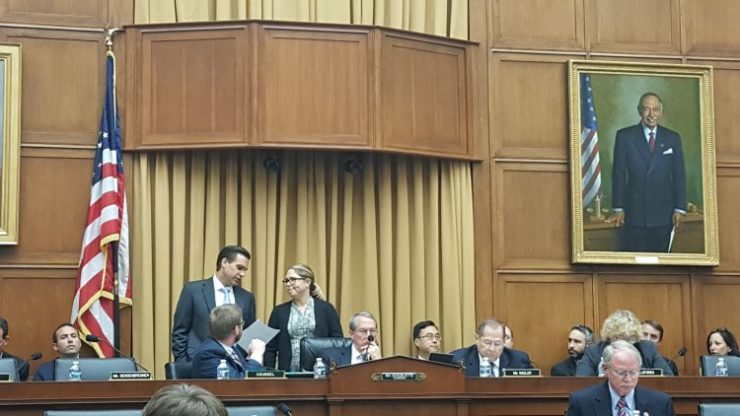Early arrival to advanced technology hearings on Capitol Hill is suggested but not required. It’s always a busy day on Capitol Hill. However, it’s not until a committee hearing that most constituents get to hear their congressional representative speak beyond the pitch to get their votes. The House of Representative Judiciary Committee recently held a hearing “Facebook, Google, Twitter: Examining the Content Filtering Practices of Social Media Giants.” The Rayburn Building was in rare form on July 17 during the tech hearing.
A Different Demographic Line-Up
The line leading into the chambers for the hearing was rather lengthy. Consisting of many intellectual millennials; rather tech-savvy, straightforward, and ready for the proceedings. Will filtering practices resort in being regulated like a utility or will social media giants continue to dominate the markets? It was time for the tech-savvy intellectual millennials to hear the artificial intelligence (AI) plea. They would also endure the “pardon” for the lack of urgent care and concern to protect the user’s private information by social media giants like Facebook.
Couple that with these giants not wanting any oversight while vowing to be transparent. How dare Congress consider the idea for tech giants to be regulated like a utility! Suppose for a minute committee members might consider eating their greens to gain strength to set some guidelines for these market leaders.
Chairman Bob Goodlatte, Chair of the House Committee on the Judiciary, opened the hearing asking why tech giants should be treated differently from hotels, nightclubs, and even homeowners. “Society as a whole is finding it difficult to define what these social media platforms are and what they do,” said Goodlatte during his opening remarks.
Facebook’s Head of Global Policy Management, Monika Bickert informed the committee that “Facebook is a place users have a choice and advertisers have a choice.” Furthermore, she emphasized that Section 230 of the Communications Decency Act of 1996 provides immunity from liability for providers and users of an interactive computer service.
How did America’s tech giants arrive on the Hill from the Valley in the first place? It all began during the 2016 presidential election when foreign actors were able to spread political discourse using social media platforms. The result was the most bizarre outcome of a presidential election in America’s history. Donald J. Trump became commander-in-chief. It was later revealed that an estimated 87 million social media user’s private data had been breached. Now Congress along with America’s tech giants must learn what methods of prevention these platforms plan to put forth to protect our democracy. I’m not sure these tech giants want to hear any consideration of them serving as a utility during the hearing, but something must be done.
Most recently, Facebook had another embarrassing moment during its “First Class World Premier Publishing Editorial Clearing” house phase when there was no computer recognition of one of the most important documents in America’s history; The Declaration of Independence. Meanwhile, the company has yet to mention its processing method for restoring user’s data that was compromised during the Cambridge Analytica data breach. However, users are expected to trust that no more third-parties will have unauthorized access to their data. These are pretty transparent data points, demanding the need for regulation to ensure oversight of user’s data.
Since the hearing, Twitter has updated its interface, moved a few tabs around, and slowed down its connection, it appears. Unless that is the service provider not up to speed on the spectrum, but that’s a different story. I’m not sure what the tone of the next hearing will be, but be sure America’s tech giants don’t want to hear the word “utility.”


















Add comment